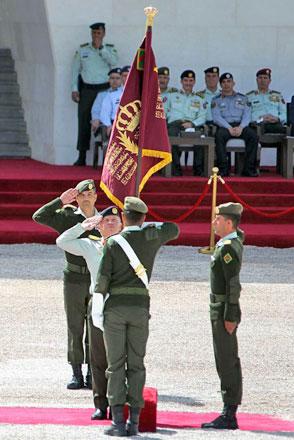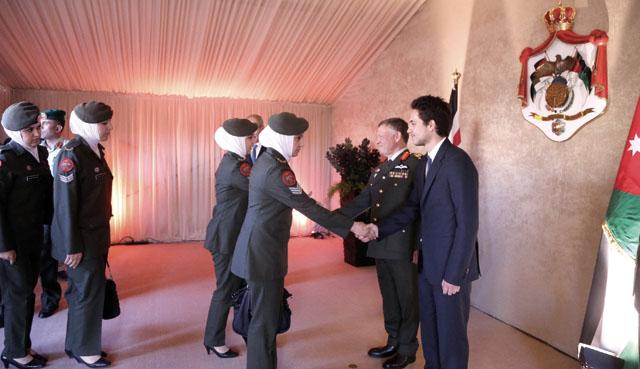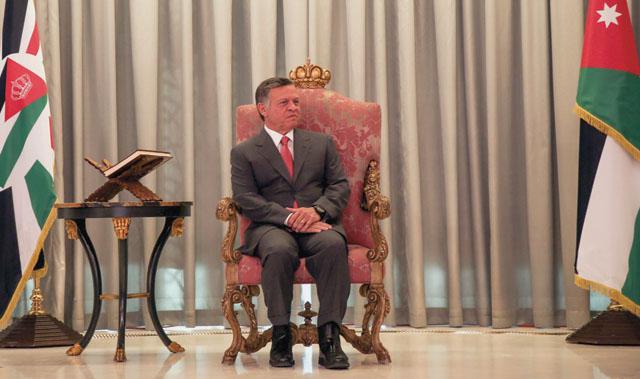You are here
Jordan marks King’s 19th coronation anniversary, Army Day and Great Arab Revolt
By JT - Jun 10,2018 - Last updated at Jun 10,2018

Jordan on Saturday celebrated the 19th anniversary of His Majesty King Abdullah’s coronation, as well as Army Day and the 102th anniversary of the Great Arab Revolt, marked on June 10 (Photo courtesy of Royal Court)
AMMAN — Jordan on Saturday celebrated the 19th anniversary of His Majesty King Abdullah’s coronation, as well as Army Day and the 102nd anniversary of the Great Arab Revolt, marked on June 10, when the emir of Mecca and the King’s great grandfather, Sharif Hussein Bin Ali, led an uprising against Ottoman rule in the region.
On the occasion, the King on Friday received cables from several heads of states, congratulating him on the anniversary of his coronation, a Royal Court statement said.
His Majesty received similar cables from senior civil and military officials, congratulating him on this occasion and the anniversaries of the Great Arab Revolt and Army Day.
HRH Crown Prince Hussein received similar cables from several senior officials and officers.
Since his coronation on June 9, 1999, the King has embarked on comprehensive democratic reform in the Kingdom, giving special attention to internal and external national issues.
In particular, he has focused on improving Jordan’s capabilities as a modern country, emphasising investment in the Kingdom’s human resources and innovation as a means to combat the nationwide shortage of natural resources.
In addition to these priorities, His Majesty has been always committed to advocating the Palestinian people's right to have an independent state and safeguarding Islamic and Christian holy sites in Jerusalem.
Under the King's leadership, Jordan is working towards a just and comprehensive peace in the Middle East and is part of an international coalition to fight terrorism.
Throughout the past 19 years, the King has carried the banner of tolerance and coexistence, launching the “Amman Message” to portray the true essence of Islam, which is based on moderation and rejection of extremism.
In addition, the UN General Assembly adopted the King’s initiative “World Interfaith Harmony Week” in October 2010.
He also sees economic reform as a major concern, and consequently directed former prime minister Hani Mulki and his government to prepare a package of measures designed to overcome economic challenges.
Under Royal directives, the previous government led by Abdullah Ensour prepared the Jordan Vision 2025, which His Majesty described as "a long-term national blueprint that outlines the integrated framework of economic and social policies based on providing opportunities for all and serving as the base to enhance the rule of law, equal opportunity, increasing public participation in policymaking and achieving sustainable and comprehensive development".
The Kingdom, under His Majesty’s rule, took the initiative to implement much-needed political reforms, with five parliamentary elections taking place over the past 19 years.
The King has said these developments would lead to "the endgame of our process: building and developing political parties and bringing forth parliamentary government”.
The Decentralisation Law, which came into force in 2015, has been aimed at enhancing public participation in development-related decisions. The King has instructed the government at the time to issue all the necessary by-laws and instructions to implement the Decentralisation Law, stressing that political reform also requires strengthening the rule of law and implementing administrative reform measures.
The September 2011 constitutional amendments necessitated the enactment or amendment of several laws, including those that mandated the establishment of the Independent Elections Commission and the Constitutional Court.
The Great Arab Revolt marks a milestone in the country’s history as it led to the establishment of the modern Kingdom of Jordan, the Jordan News Agency, Petra, reported.
The Jordan Armed Forces-Arab Army was established in Maan, 220km south of Amman, shortly after the founding of the Jordanian state under the name "the Emirate of Transjordan" in 1921.
It comprised 750 personnel of gendarmerie, infantry and camel cavalry, according to Petra.
Related Articles
His Majesty King Abdullah, the Supreme Commander of the Jordan Armed Forces (JAF), accompanied by HRH Crown Prince Hussein, on Tuesday attended celebrations marking the anniversary of the Kingdom’s Independence Day, the King’s coronation, Army Day and the Great Arab Revolt.
AMMAN — The Ministry of Culture on Sunday announced a competition to design a slogan for the 20th anniversary of His Majesty King Abdullah’s
Jordan celebrates the 15th anniversary of His Majesty King Abdullah’s coronation on Monday.













